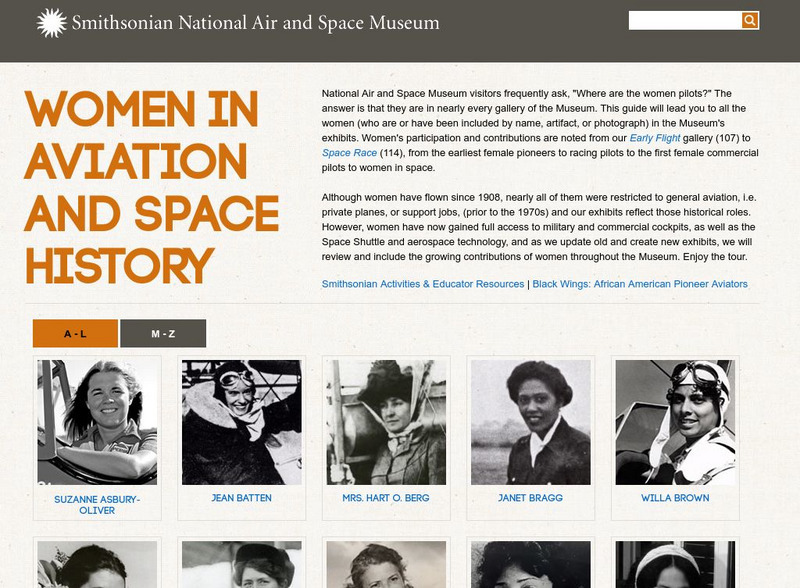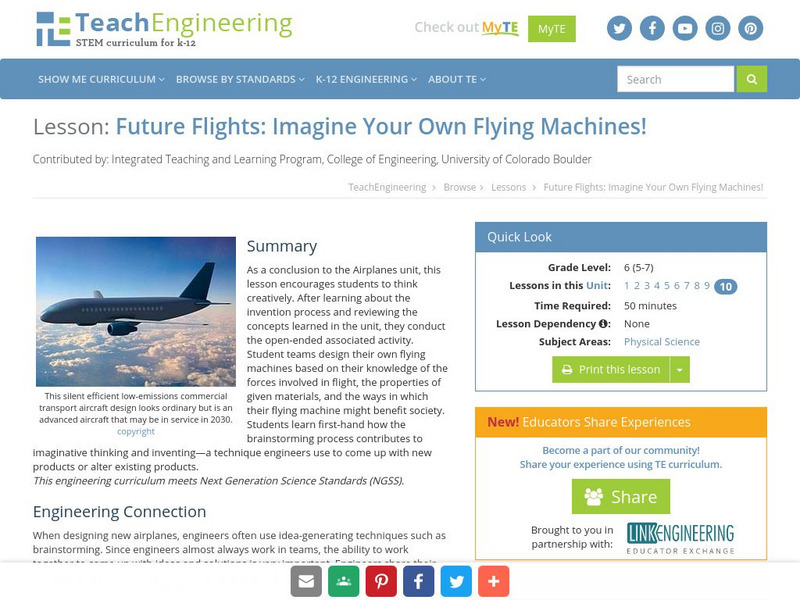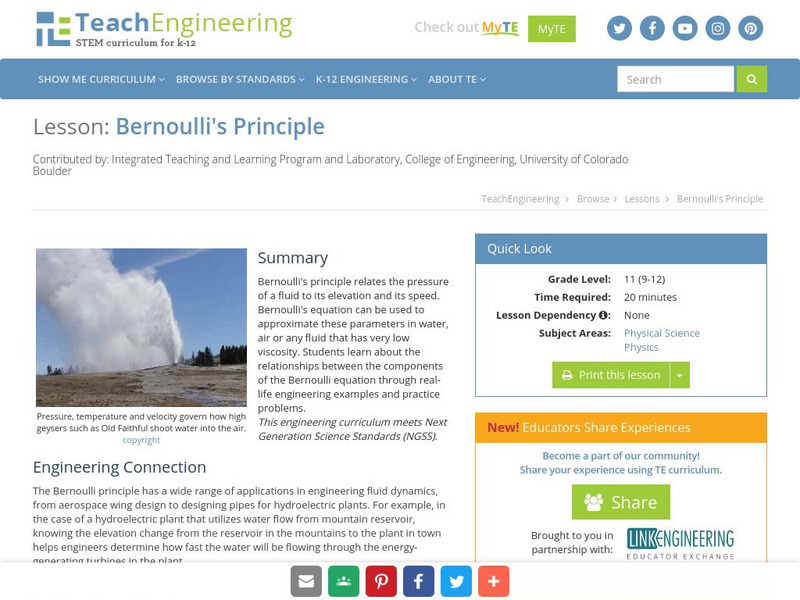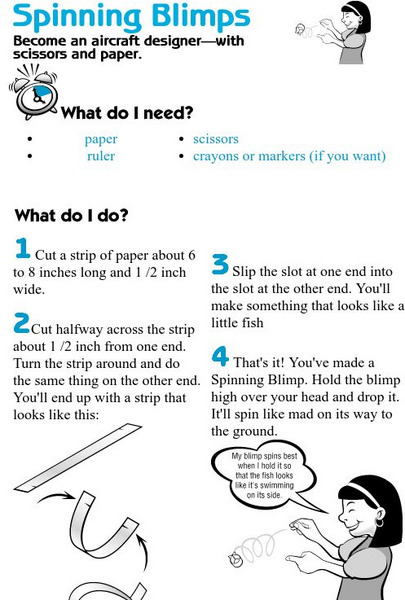Other
National Aviary: Curriculum: Wings to Fly
Richly illustrated interactive activity leads you through an investigation of bird wings. Includes interesting comparisons of the bones in a bird's wings with those in human arms and of the design of wings in birds versus planes.
Smithsonian Institution
National Air and Space Museum: Wright Brothers: Interactive Experiments
Three interactives in an online exhibition about the Wright Brothers. The first is an engineering activity on the forces of flight, and is accompanied by a lesson plan for Grades 6-8. The second is a gallery of original artifacts related...
Smithsonian Institution
National Air and Space Museum: Women in Aviation and Space History
Find information on the many women who became well known for their part in aviation history. Click on one of the drop down menus on the left to find a name, then click on the name to see a short description of the woman and her...
University of Wisconsin
The Why Files: On the Wing: Birds, Skeeters, Jet Planes
Evolution through natural selection governs the "design" of flying creatures. Engineers design flying machines. But flying is about physics, and physics is the ultimate arbiter of both processes, and that produces parallels in mechanical...
Other
The Poetry of John Haines
This introduction to a new collection of John Haines' poetry by poet and critic Dana Gioia surveys Haines' work and includes the poem, "The Flight."
The Henry Ford
Henry Ford Museum & Greenfield Village: Wright Brothers
Biographical information on the Wright Brothers, including their childhoods, the Wright Cycle Shop, the world's first airplane, a chronology, and links to more information.
Smithsonian Institution
National Air and Space Museum: Milestones of Flight
This Smithsonian National Air and Space Museum site tells the history of fight with an easy to use timeline. Also, find out about specific flights in the list of links.
TeachEngineering
Teach Engineering: Up, Up and Away! Airplanes
The airplanes unit begins with a lesson on how airplanes create lift, which involves a discussion of air pressure and how wings use Bernoulli's Principle to change air pressure. Following the lessons on lift, students explore the other...
TeachEngineering
Teach Engineering: Future Flights!
This lesson is an exciting conclusion to the airplanes unit that encourages young scholars to think creatively. After a review of the concepts learned, students will design their own flying machine based on their knowledge of the forces...
TeachEngineering
Teach Engineering: Bernoulli's Principle
Bernoulli's principle relates the pressure of a fluid to its elevation and its speed. Bernoulli's equation can be used to approximate these parameters in water, air or any fluid that has very low viscosity. Young scholars learn about the...
NASA
Nasa: X1 Paper Glider Kit
This lesson allows students to build their own paper gliders and change characteristics of the glider to make it fly easier.
NASA
Nasa: Drag, Lesson 4
This video [12:28] shows how Newton's law of motion relates to the drag of an airplane. Watch as an instructor shows how the molecules colliding with the airplane create drag.
NASA
Nasa: Aeronautics Educator Guide
This NASA educator's guide provides teachers with an outline for teaching aeronautics activities. Through hands-on activities, students can learn all about flying.
NASA
Nasa: Jsc Home Page
NASA's Johnson Space Center is located near Houston, Texas and was constructed as "the primary center for: design, development testing of spacecraft and associated systems for human flight; selection and training of astronauts; planning...
Other
Charles lindbergh.com: Charles Lindbergh: An American Aviator
Everything that could possibly be known about Lindbergh is at this site: The flight, Anne Morrow Lindbergh, the kidnapping, and more.
PBS
Pbs: El Nino
You can link to the anatomy of El Nino, chasing El Nino, and El Nino's reach. There is a resource page and a search page.
NASA
Nasa: Solar Energy for Space Exploration
This activity book includes lessons and objectives for students to explore solar energy for space exploration. Students will play an active part in decision making for space exploration.
PBS
Pbs Mathline: Boeing: Engineer a Jetliner
In this performance task, students will assume the role of an aerospace engineer. Students will develop wing and engine design solutions.
TryEngineering
Try Engineering: Designing Drones
This lesson focuses on helicopters and drones, how they fly, how they are used in different ways that help people and the environment. Teams of students explore helicopter flight; and design, build, and test their own simple rotor out of...
Science Buddies
Science Buddies: Diy Mini Drone
Explore the world of drones as you build your own mini drone using popsicle sticks in this fun activity.
Science Buddies
Science Buddies: Teaching the Scientific Method With Paper Rockets
This lesson will introduce your students to the scientific method using a fun, hands-on activity.
Science Buddies
Science Buddies: Learning the Scientific Method With Paper Rockets
Learn about the scientific method in this activity that uses rockets made from nothing but paper, tape, and straws.
Children's Museum
The Children's Museum of Indianapolis: Curious Scientific Investigators: Flight Adventures
Students will make paper rockets, parachutes, and foam gliders to experience how objects move through the air. Explore topics such as thrust, weight, gravity, force, and lift through fun activities and stories and cutting-edge work done...
Exploratorium
Exploratorium: Spinning Blimps
Students create a blimp and then experiment with the design to improve its aerodynamics.




















